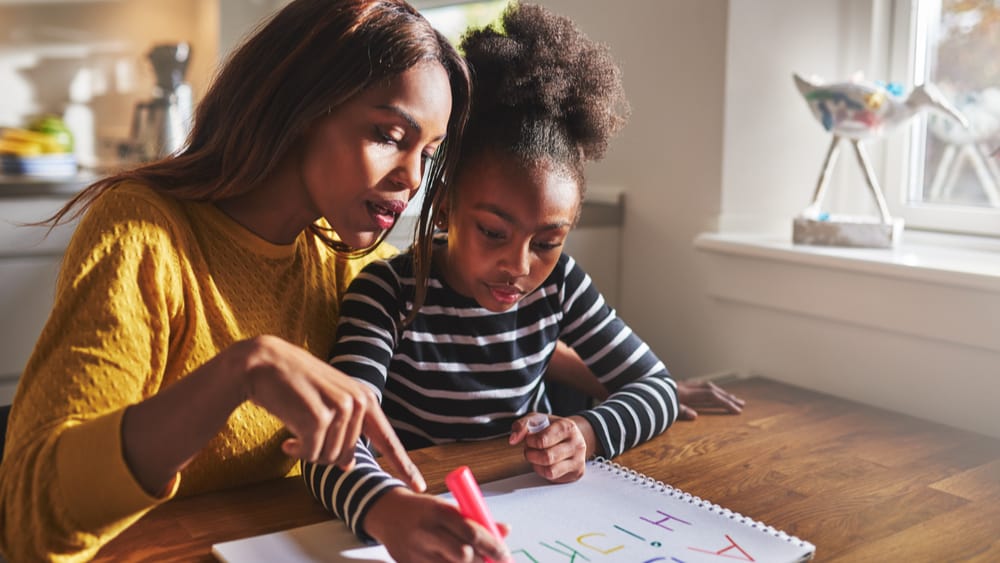[ad_1]
With more and more school districts shifting to online
learning, the needs of the most vulnerable members of society are being
excluded from consideration. As director of activism for brightbeam, a network
of activists fighting for education justice, I work with parents across the
country. Many of the people I work and speak with are single parents or parents
with limited means. To put a face on these families, many are working-class,
African American, single-income households, and often headed by Black women. As
they cope with the pandemic, they have a new challenge: navigating how to both
work and educate their children.
From the data, we know that Black women make up 70
percent of households. According to the National Partnership for Women and
Family, “Black
women in the United States who work full time, year-round are typically paid
just 62 cents for every dollar paid to white,
non-Hispanic men. The wages of Black women are driven down by a number of
current factors including gender and racial discrimination, workplace
harassment, job segregation and a lack of workplace policies that support
family caregiving, which is still most often performed by women.”
While this is problematic on its face, it’s disastrous
during an international pandemic. Black women are not making the kind of money
they need to meet their family’s basic needs. This was true before the
pandemic, and it is amplified now. What’s more, many of these women are
essential workers, making their exposure to COVID-19 much higher than that of their
counterparts. As essential workers, they are required to go to work, even while
others have the luxury of working from home. As essential workers, their
ability to assist their children with online learning is limited. There is real
potential of children from these households falling behind. And if any have intellectual,
emotional or physical disabilities, they and their families face an even steeper
road when it comes to adjusting to online instruction.
Further, Black women face a dilemma of being
criminalized for being working class or living in poverty. If they go to work,
they must leave their children home alone. If they prioritize work so they can
feed their families, their children risk being labeled truant if they do not
log on or do not log on at the correct time. If they stay home and prioritize
educating their children, they risk cuts in their already stretched paychecks.
If they do not log a certain number of hours at work, they may experience a pay
cut or even job loss.
If there is one thing I want readers to take away, it
is this: When middle-class people make decisions about school closures, they
speak from their social location, which is drastically different from that of
working-class and single-parent households. While a two-parent household of
means may be able to adapt to online-only instruction, doing so may be harder,
or even impossible, for working-class parents or single mothers. For this
reason alone, school districts should not create reopening plans without
including these families’ perspective.
In these trying times, parents need direct cash
assistance. We should be advocating for an education stipend for parents to
hire a tutor or another responsible adult to help educate and care for
their children. One way to do this is to divert a portion of the per pupil
expenditure to families should districts impose virtual-only learning. Finally,
we should be ensuring universal free broadband services for all families
who need it, designating it as a public utility.
Instead of pursuing such paths, some Florida teachers
and the Florida Education Association are suing to stop the planned reopening
of schools in the area. And school officials in places such as Fairfax
County, Virginia, Arlington
County, Virginia, and Wake County, North Carolina, all
announced plans to move classes online for the start of the upcoming school
year. In North Carolina alone, at least
13 school districts have announced plans to move classes online.
As a nation, we have a responsibility to ensure all
children are educated safely and in a way that does not criminalize them or
their parents. We know the school-to-prison pipeline is a real phenomenon,
wreaking havoc on the lives of far too many Black and Brown children, children
with disabilities and children identifying as LGBTQ. We do not need to make it
worse by creating policies that are silent on diverse families’ needs.
To pretend that children from single-parent and
working-class households will not be adversely impacted by one-size-fits-all
policies is to willfully close one’s eyes and ears to these families’
struggles. To pretend that these families will be able to hold it all together,
without more flexible arrangements to support those who work and parent alone,
is the height of fantastical thinking.
Unfortunately, the narrative around school reopening is limited. It is a binary discussion of whether schools reopen or remain closed. When school officials and city leaders mandate online instruction only, they are telling children from single-parent and working-class homes that they are not worth educating. When teachers and teachers unions, such as the Florida Education Association, threaten to sue over schools reopening in the fall, they are placing children from single-parent households in jeopardy. I see this. My hope is that others will too.
Zakiya Sankara-Jabar is the national director of activism at brightbeam and the co-founder of Racial Justice NOW!, and she has served as the national field organizer at Dignity in Schools Campaign. She is a preeminent thought leader in racial and education justice and has received numerous awards.
[ad_2]
Source link

